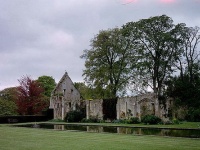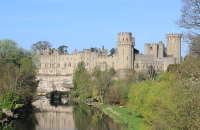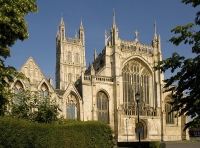City guides


The Cotswolds Travel Guide
The Cotswolds region epitomises English country quaintness. With names such as Chipping Campden, Moreton-in-Marsh, and Stow-on-the-Wold, the Cotswold towns and villages have a fairytale like air. It's hard to ignore the rural tranquillity, with small bridges crossing shallow rivers, colourful gardens leading up to pretty stone cottages, and rolling fields broken up by manicured hedges and drystone walls. As one of England's most picturesque areas, visitors may well feel as though they've stepped into one of Constable's paintings.
Historically the Cotswolds region was famous for its wool production and the many beautiful churches, manor houses, and villages built on the back of this trade are testament to this period of wealth. The industrial revolution appears to have passed by the Cotswolds as life here does not seem to have changed much over the centuries.
The charming town of Cirencester is the self-styled capital of the Cotswolds and is a good base from which to explore the region. In Roman times, Cirencester was the second most important city in England, though little evidence of this period remains.
Other popular market towns include Bibury, Burford, and Tetbury, which is the nearest town to Highgrove, the Prince of Wales's country retreat, and Gatcombe, home to his sister the Princess Royal. There are many other quaint villages where a room can be taken in the local pub or bed-and-breakfast. The larger towns of Bath, Cheltenham, Stratford-Upon-Avon, and Oxford are on the edge of the Cotswolds, making the region a very popular choice with tourists.
Things to do in The Cotswolds
The Cotswolds are home to some big attractions such as castles and estates, as well as some historic towns and cities, but a holiday in the region is mostly punctuated by small tourist gems such as speciality museums, gardens and quaint historic cottages.
For instance, Moreton-in-Marsh boasts the very popular Cotswold Falconry Centre and the Batsford Arboretum, which is home to one of the largest private tree collections in England. Bourton-on-the-Water will delight families with the Giffords Circus and the Dragonfly Maze, and is also home to the small but special Cotswold Motoring Museum.
Getting around the Cotswolds is best achieved by hiring a car which allows visitors to explore at their leisure, although organised tours are also a good option. The region is around a two-hour drive from London, along the M4 or M40.
Those wanting to explore this pretty region on foot should walk the Cotswold Way, a National Trail which winds from Chipping Campden to Bath. It takes about a week to walk the whole stretch but many people opt to enjoy small sections of the hike by walking from one village along the route to another.

Sudeley Castle
Set against the beautiful backdrop of the Cotswold Hills, Sudeley Castle is steeped in history. With royal connections spanning a thousand years, it has played an important role in the turbulent and changing times of England's past. The castle was once home to Queen Katherine Parr (1512-48) following her marriage to Sir Thomas Seymour, and has also housed Lady Jane Grey. Henry VIII, Anne Boleyn, and Queen Elizabeth I all visited Sudeley Castle in its heyday. King Charles I stayed here, and his nephew Prince Rupert established his headquarters at the castle during the civil war. Following its destruction by Cromwell's troops, Sudeley lay neglected and derelict for 200 years; however, its romantic situation and ruins attracted many visitors, including King George III. In 1837, Sudeley was bought by John and William Dent, successful businessmen from Worcestershire who began an ambitious restoration programme. Within the castle's apartments are a range of historic possessions dating from the civil war and an important art collection, including paintings by Van Dyck, Rubens, Turner, Reynolds, Claude, and Jan Steen. The romantic 14-acre grounds are worth a visit from March to September, and are the setting for outdoor Shakespeare performances, concerts, and other events in summer.

Warwick Castle
Warwick Castle's origins date back to before 1066, and although not used as a Royal residence but rather as the seat of the Earls of Warwick, its history is tied inextricably to the throne through the influence held by the castle's lords. Today, the castle is owned by the Tussaud's Group, which has refurbished most of the original grounds, and which has begun to use the castle as the setting for an annual wax pageant featuring historical figures. A new addition to the castle's programme of events and activities is the ghoulish Warwick Dungeon, which features a thrilling 'Witches of Warwick' exhibition that is guaranteed to delight young and old visitors alike. Note that children under the age of 10 might find the Castle Dungeon experience a little scary.

Gloucester
Gloucester is known primarily as a ceremonial city, and as one of the larger towns in the Cotswolds region. It is home to several popular attractions, including Gloucester Cathedral, whose richly decorated halls contributed to the set of Hogwarts in the Harry Potter films; Prinknash Abbey, and bird park; the 18-century Docks, home to museums, shops, restaurants and pubs; and the City Museum and Art Gallery, which houses many artefacts relating to Gloucester's Roman heritage. Just outside the city of Gloucester is the picture-perfect Gloucestershire village of Painswick, and any number of beautiful walks and hikes in the surrounding countryside.
The Cotswolds Climate and Weather
The weather in the Cotswolds region is mild throughout the year but it does receive a large amount of rainfall. The warm Gulf Stream in the Atlantic Ocean passes by England's west coast moderating the weather and ensuring that year-round temperatures are more temperate and constant. During the winter months, from November to February, the average temperature is around 39F (4C), while during the summer months, from April to August, the average temperature reaches a pleasant 80F (26C).
United Kingdom travel info
Electricity
The electrical current in the UK is 240 volts, 50Hz. Flat, three-pin plugs are standard.
Language
English is the official language, though visitors will be astonished by the variety of regional accents.
Money
The currency is the British pound (GBP), which is divided into 100 pence. ATMs are available in almost all towns and Visa, MasterCard and American Express are widely accepted. Foreign currency can be exchanged at bureaux de change and large hotels, though better exchange rates are likely to be found at banks.
Tipping
Tips of 10 to 15 percent are expected in restaurants and upmarket hotels in the UK if a service charge hasn't been included. Hotel service staff receive an optional amount, while taxi drivers are usually given 10 to 15 percent of the fare. Tipping bartenders isn't expected, and tipping for other services is discretionary.
Health
There are no specific health risks associated with travel to the UK and food and water can be considered safe. The British National Health Service is excellent, and a number of countries have reciprocal health agreements with the UK including Australia, New Zealand and EU countries. Visitors from other countries such as Canada, South Africa and the United States are advised to take out comprehensive travel insurance.
Safety
It's generally safe to travel throughout the UK.
Local customs
Handshaking is customary when introduced to someone new. Smoking is banned in all enclosed public spaces, including pubs, restaurants and public transport. Queue barging is frowned upon and there is strict etiquette on escalators: stand on the right, walk on the left. Visitors may find Londoners more rushed and less friendly than locals in other parts of the country, particularly on London transport, where tourists are often the only people who talk.
Doing business
The four countries of the United Kingdom, although culturally and historically different, generally keep to the same business practices. Politeness and punctuality are key to good business relations and initial meetings are often conducted formally and impersonally, becoming more open and social as things progress. Business cards are exchanged at introductions, and dress is formal with dark suits preferred. Business hours are generally 8am to 5pm Monday to Friday with an hour taken at lunch.
The communication style can be difficult to adjust to: the British people respect politeness to a point that often obscures their ability to say exactly what they mean. As a result, travelling business people may need to learn to 'read between the lines' and to take cues from tone of voice and facial expression. Humour is also an integral part of the British system of communication, and is used to diffuse a tense situation and to cultivate relationships. Foreigners should never assume that an attempt at humour undermines a person's ability to do their job, or discredits the importance they attach to a deal or negotiation. Furthermore, they shouldn't be fooled into thinking that the British propensity for irony and sarcasm equates with an informal work environment.
Foreigners should be tactful during meetings, avoid becoming emotional and illustrate their experience with the subject at hand. Performance and initiative are looked upon favourably, whereas academic pretension is given far less credence. Meetings are often used as platforms for debate, rather than moments of confirmation, so there should be no surprise if not much progress is made. Foreigners should be sure to respect and appeal to all parties involved, as the British have recently begun to take a far flatter approach to management and the responsibility of decision-making. And if things go well, it's worth purchasing a pint or two for clients or colleagues; though gifts are borderline inappropriate, a round of drinks will rarely be refused.
Duty free
Travellers can bring the following goods into the UK tax or duty free: 200 cigarettes, 100 cigarillos, 50 cigars or 250g of tobacco, 18 litres of still table wine, 42 litres of beer, 4 litres of spirits or strong liqueurs or 9 litres of fortified wine, sparkling wine or other alcoholic beverages of less than 22 per cent volume.
Communications
The international country dialling code for the UK is +44. Mobile phone coverage is extensive and free WiFi is widely available in pubs and coffee shops. Travellers can purchase local prepaid SIM cards for unlocked phones or use eSIMs if their cellular providers support it on their networks.
Passport & Visa
If a visa is not required, travellers should hold a return or onward ticket, and proof of funds for the duration of stay. Passports must be valid for the period of intended stay in the UK. It's highly recommended that travellers' passports have at least six months' validity remaining after the intended date of departure from their travel destination. Immigration officials often apply different rules to those stated by travel agents and official sources. For visitors who are visa exempt up to a maximum stay of six months, the period of stay will be determined by the Immigration Officer on arrival.
Entry requirements
US travellers must hold a passport that is valid for the duration of their stay; a visa is not required for stays of up to six months.
Canadian passports must be valid for at least the expected duration of the stay. No visa is required for stays of six months or less.
Australian passports must be valid for at least six months after the departure date. No visa is required for stays of six months or less.
South Africans require a valid passport and a visa for entry or transit through the UK. South African temporary passports are not recognised.
Under the Common Travel Area agreement, citizens from the UK and Ireland are not required to pass through passport control. They can travel between both countries without a valid passport if they can prove they are a valid UK or Irish national.
New Zealand nationals must hold a valid passport, but no visa is required for stays of up to six months.
Useful contacts
United Kingdom Tourism Website: www.visitbritain.com
999 (General)Embassies / consulates in other countries
British Embassy, Washington DC, United States: +1 202 588 6500.
British High Commission, Ottawa, Canada: +1 613 237 1530.
British High Commission, Canberra, Australia: +61 2 6270 6666.
British High Commission, Pretoria, South Africa: +27 12 421 7500.
British Embassy, Dublin, Ireland: +353 1 205 3700.
British High Commission, Wellington, New Zealand: +64 4 924 2888.
Embassies / consulates in United Kingdom
United States Embassy, London: +44 20 7499 9000.
Canadian High Commission, London: +44 20 7004 6000.
Australian High Commission, London: +44 20 7379 4334.
South African High Commission, London: +44 20 7451 7299.
Irish Embassy, London: +44 20 7235 2171.
New Zealand High Commission, London: +44 20 7930 8422.


